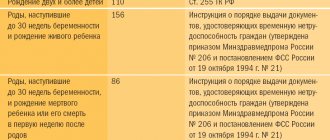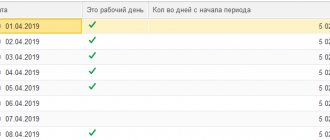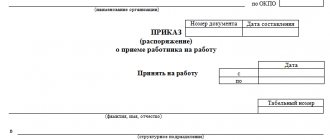The standard working time for 2021 is the total number of days and hours to be worked during a certain period by each employee. It is convenient to track the standard using the production calendar. It provides monthly calculations of working days, weekends, holidays and norms of working hours for working weeks of different lengths. The basis for deriving standard values is the provisions of the Labor Code of the Russian Federation and Order of the Ministry of Health dated August 13, 2009 No. 588n “On the procedure for calculating working time standards.”
norma_chasov.jpg
The standard working time for the 2021 reporting year, broken down by month, varies due to the unequal length of working weeks for different categories of personnel. In the standard version, the weekly work rate is 40 hours (8 hours daily with two days off, one of which is on Sunday). For some groups of employees, the employer is required to establish a reduced working time - 36 hours per week or 24 hours (with daily work of 7.2 and 4.8 hours, respectively).
Independent calculation of the working standard may also be necessary if the enterprise employs minor workers. The limit values for the duration of daily work for them are determined by Art. Labor Code of the Russian Federation.
Monthly working hours for 2021 are lowest in January. This is due to the long New Year holidays. There is one public holiday in February; before this date, the working day for all employees must be shortened by 1 hour.
The length of working hours is also affected by the postponement of weekends and holidays. For 2021, the list of such transfers was approved by the Government in Resolution No. 1250 dated October 14, 2017. The standard working hours for March 2021 takes into account the holiday and the transfer from January 6. Due to this, two additional days of rest and one shortened working day were formed during the month.
Read also: Normal working hours
The work schedule in April was also adjusted by postponements. In May there are long weekend breaks that are typical for this month.
The working time standard for June 2021 contains a postponement of days off, implemented within one month. The hourly work standard is set taking into account the public holiday on June 12 and a shortened shift the day before (20 working days x 8 hours in each working day - 1 hour shortened before the holiday = 159 hours per month).
The working time standard in July 2021 does not have any “holiday” nuances; it reflects only full working days. Let's look at an example of calculating the July standard:
- in relation to a basic 40-hour week – 176 hours (22 working days x 8 hours of daily work);
- for a 36-hour weekly output, the standard is 158.4 hours (22 working days x 7.2 hours of work per day);
- with a 24-hour weekly norm, the hourly working time per month will be 105.6 hours (22 working days x 4.8 hours of daily work).
The working hours in August 2021 do not include holidays or shortened days. There are no additional days of rest in September-October. There is one holiday in November, but before it there is no reduction in working hours. In December there is an intra-month transfer and 1 shortened day on the 29th.
Production calendar for 2021 with a five-day work week
The calendar has been compiled in accordance with the draft resolution of the Government of the Russian Federation on the transfer of days off. It is planned to postpone the following weekends: from Saturday, January 6 to Friday, March 9; from Sunday January 7 to Wednesday May 2; from Saturday 28 April to Monday 30 April; from Saturday 9 June to Monday 11 June; from Saturday 29 December to Monday 31 December.
Download the 2018 Production Calendar for a six-day work week, as well as production calendars for previous years.
| ||||||||||||||||||||||||||||||||||||||||||||||||||||||||||||||||||||||||||||||||||||||||||||||||||||||||||||||||||||||||||||||||||||||||||||||||||||||||||||||||||||||||||||||||||||||||||||||||||||||||||||||||||
Formula for calculating standard working hours
The standard working time for a specific month is calculated using the following algorithm:
Duration of the working week in hours / 5 x Number of working days in a particular month according to the production calendar for a five-day working week - Hours by which working hours were reduced in the month in question on pre-holiday dates.
The annual standard of working time is calculated in a similar way, only the number of all working days in a year and the total annual number of hours by which work is reduced on holidays are taken into account.
It should be taken into account that the normal length of the working week should not exceed 40 hours, including during the “six-day work week” (Article of the Labor Code of the Russian Federation).
Labor Code of the Russian Federation 2021 work on weekends and holidays
The performance of professional duties during non-working hours (weekends, holidays) is specified in Chapter. 18 Labor Code of the Russian Federation. It provides for the duration of weekly rest, payment for missed holidays, a ban on calling employees on certain days, and exceptions to the rules.
Art. 113 of the Labor Code of the Russian Federation limits work on weekends and holidays. But if it is impossible to stop production or it is necessary to urgently eliminate the accident, then some workers are involved, but only with written consent and for additional payment. True, only people with disabilities and women with young children can completely refuse to work on weekends or holidays. For this, they will not lose the benefits provided by the Labor Code of the Russian Federation and will not be dismissed.
Dismissal: order
The Labor Code of the Russian Federation obliges to formalize labor relations and stipulate the conditions of dismissal. This forces the parties to fulfill their obligations, and in case of a dispute, to resolve it in court. Typically, an employment agreement is valid for a certain period, after which the dismissal procedure begins.
On the topic: Is it possible to obtain Russian citizenship if the wife is a citizen of the Russian Federation
But he may leave work for other reasons, for example, on the initiative of management, due to a bad attitude towards the new boss, due to non-compliance with obligations by the employer, or unwillingness to work on weekends and holidays.
Regardless of the grounds for dismissal, the employee notifies his superiors of his resignation 14 days in advance (for a fixed-term contract - 3 days in advance). During this period, according to the Labor Code of the Russian Federation, the employee has the opportunity to withdraw the application, and the employer has the opportunity to find a new person. If there are enough people on staff, dismissal from work can take place even on the day of the application - the law does not prohibit this.
The Labor Code of the Russian Federation also stipulates that full payment is made on the day of dismissal, and the employee receives all documents about work activity, first of all, a work book.
Free legal consultation by phone:
8
What are the working hours?
According to the Labor Code of the Russian Federation, the traditional working week includes 40 hours. You must take at least 42 hours off from work during the week, and always on Sunday. Depending on the calendar and shift schedule, the employer may add Saturday or Monday to it. If, due to work, it is impossible to provide rest on the usual weekend days, it is transferred to consecutive weekdays. It will not be possible to change this regime, even if you threaten the employer with dismissal.
The parties may provide for different working hours when necessary, especially if flexible or part-time work is provided. In this case, work and payment on officially non-working days are specified separately.
In a working week lasting 6 days, according to the Labor Code of the Russian Federation, only one day is allowed for rest (Article 111 of the Labor Code of the Russian Federation). Moreover, this is not necessarily a Sunday, and a coincidence will rarely occur if the organization maintains an uninterrupted production and technical process, and rest days are distributed according to a specially drawn up plan.
Topic: Survivor pension in 2021
Norm for cumulative accounting
When summarizing work time, the accountant must focus on the standards of the calculation interval approved at the enterprise, without linking it separately to each month. During one such interval, the employee’s time sheet may alternate between periods of overtime and underwork, and based on the total amount of hours for the required period, compliance with the standard is obtained.
For example, standard working hours for 2021 in the date range from January to March with a 40-hour week are equal to 446 hours (136 hours + 151 hours + 159 hours). The employee’s timesheets for the indicated months recorded the following data on work:
- in January 122 hours against the norm of 136 hours;
- in February 159 hours against the standard of 151 hours;
- in March, 165 hours were worked, which is 6 hours higher than the base rate of 159 hours.
As a result, in 3 months the person worked the required 446 hours (122 + 159 + 165), there is no overtime, the employee will receive a salary in the required amount.
Procedure for calling to work on weekends
The administration of the organization is obliged to properly record the fact that an employee is involved in work on an officially established day off. The documentation procedure takes place in the following order:
- The head of the department draws up a memo justifying the need for individual employees to work on days off. The document indicates the names of the employees and the length of the working day;
- The personnel service issues a notice in which employees are notified of the need to perform official duties on a day off and of the provision of compensation in the form of increased pay or time off. Familiarization with this document of employees called to work is confirmed by their signatures;
- Employees submit applications to the head of the enterprise about the compensation option they have chosen;
- An order is drawn up for the organization about specific employees going to work on a day off, which prescribes increased pay or the provision of an additional day of rest. All interested parties must familiarize themselves with the management's order and sign.
Transfers of holidays in 2018
The Government of the Russian Federation adopted a Resolution on the transfer of days off in 2021 (Resolution of the Government of the Russian Federation dated October 14, 2017 No. 1250). The following weekends will be postponed in 2021:
- Saturday 6 January to Friday 9 March;
- Sunday 7 January to Wednesday 2 May.
In addition, the Government decided to make three working Saturdays:
- April 28. At the same time, Monday April 30 will become a non-working day, and we will rest from April 29 to May 2 inclusive;
- the 9th of June. Due to this, the June holidays will last three days: from June 10 to June 12 inclusive;
- December 29 (New Year holidays 2019 will begin on December 30, 2018









